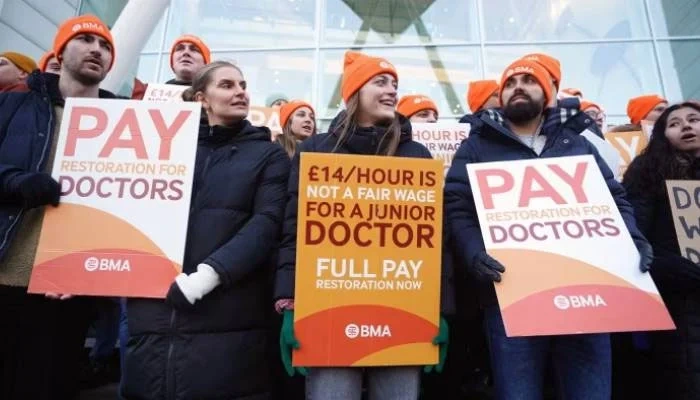Resident doctors across England have announced a five-day strike in protest against low pay and worsening employment conditions. The industrial action, organized by the British Medical Association (BMA), is scheduled to begin at 7 a.m. on November 14 and continue until 7 a.m. on November 19.
According to reports by The Guardian and The Observer, this will be one of the longest walkouts in the history of the National Health Service (NHS). The dispute highlights growing frustration among doctors who argue that the government has failed to address years of declining real-term wages and job insecurity.
Resident doctors, who were previously known as junior doctors, make up nearly half of all medical staff in the NHS. They play a critical role in keeping hospitals and clinics operational. However, as The Observer noted, morale within the healthcare sector has fallen sharply, with many young doctors considering leaving the profession or moving abroad for better pay and working conditions.
Dr Jack Fletcher, chair of the BMA’s Resident Doctors Committee, said that the decision to strike was not taken lightly. “This is not where we wanted to end up,” he stated. “We spent much of the past week in talks with the government, trying to convince the Health Secretary to take meaningful action to resolve the employment crisis that is leaving so many doctors without stable jobs.”
He added that according to a recent BMA survey, nearly half of second-year doctors in England are struggling to find employment within the NHS, even as hospitals face record staff shortages and millions of patients continue to wait for treatment.
Dr Fletcher also criticized the government’s latest pay proposal, which included an hourly wage increase of just one pound spread over four years for newly qualified doctors. He described it as “an insult to the profession” and said it fails to reflect the level of responsibility and skill required of medical staff working under immense pressure.
The Guardian reported that the ongoing dispute has put significant strain on the NHS, which is already facing an unprecedented backlog of patients and a shortage of skilled personnel. The government has expressed disappointment over the strike announcement, urging doctors to return to negotiations instead of walking out during what officials describe as a critical period for the health service.
However, the BMA insists that the strike is necessary to force meaningful reform. The Observer highlighted that the union has warned of further action in the coming months if the government does not present a credible plan to restore fair pay and improve job security for doctors.
Healthcare analysts believe that the November strike could severely disrupt hospital operations, with thousands of appointments and surgeries expected to be postponed. Despite this, public sympathy for the doctors remains strong, as many see the walkout as a fight to preserve the integrity of the NHS and ensure sustainable working conditions for future generations of medical professionals.






